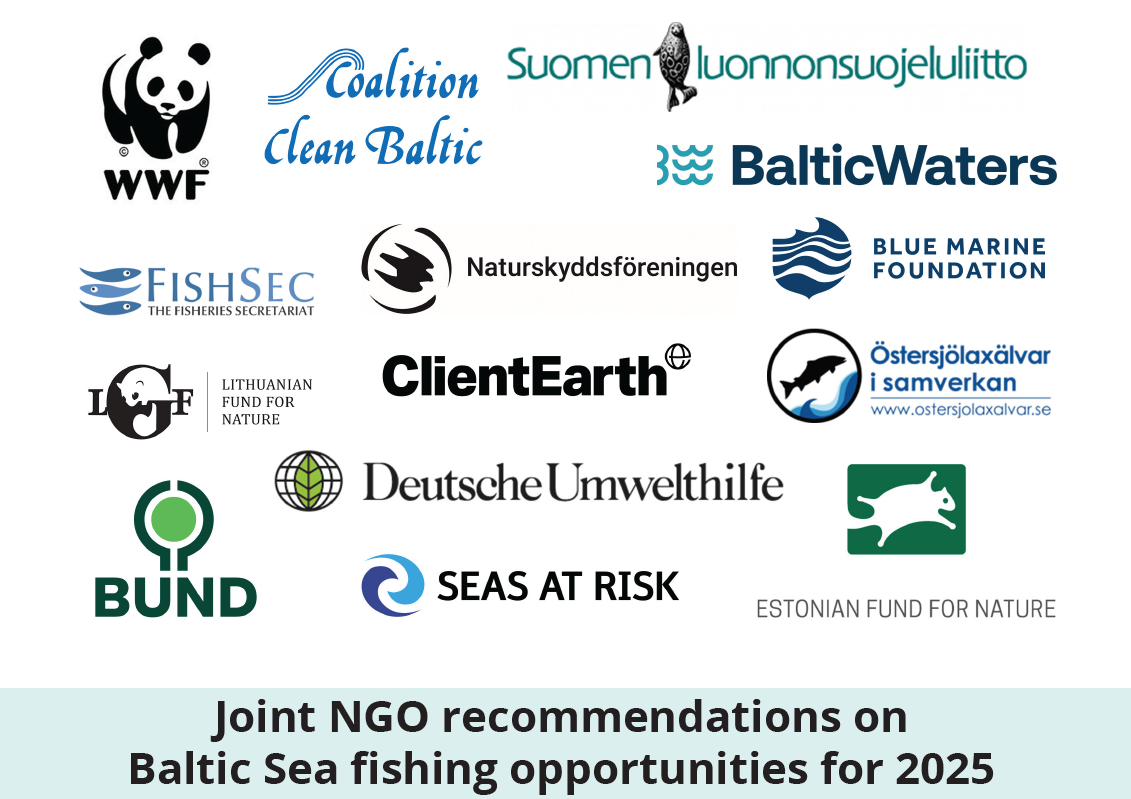Joint NGO recommendations on Baltic Sea fishing opportunities for 2025
On Friday, 31 May, the International Council for the Exploration of the Seas (ICES) published its scientific advice on how much fish can be caught in the Baltic Sea next year. In response, environmental NGOs from around the Baltic Sea region urge the European Commission to propose, and fisheries ministers to adopt fishing opportunities at levels well below the ICES headline advice to safeguard ecosystem needs and dynamics and allow for the recovery of fish populations.

The decline of fish populations in the Baltic Sea ecosystem has by now been extensively documented and analysed. The decline has been ongoing for decades but has escalated in recent years with some fish populations collapsing and the effects of the climate crisis manifesting itself. So far any policy interventions have not been ambitious enough to reverse or even just halt the negative trends. The
third HELCOM Holistic Assessment of the State of the Baltic Sea (HOLAS 3) that came out last December, concludes that the ecosystem is in extreme distress and that species extraction is one of the main threats to Baltic Sea biodiversity. This year the ICES assessment shows yet again that populations of commercially harvested stocks are not in a healthy state: Both cod populations remain in a state of collapse, there is high uncertainty on the status of the herring populations, salmon is in decline and sprat has had very low recruitment for the fourth year in a row. Of the fish populations with catch advice, only the plaice spawning stock biomass is high, however alarming signals indicate a high number of small and skinny fish, leading to high levels of discards.
Overall, we urge the European Commission to propose, and fisheries ministers to adopt fishing opportunities at levels well below the ICES headline advice (and below the FMSY point value where available) to safeguard ecosystem needs and dynamics and allow for the recovery of fish populations.
Concretely this means the following:
For TAC-setting for 2025
1. Set catch limits well below the best available scientific advice provided by ICES, in order to
effectively and rapidly rebuild all fish populations and ensure long-term population and
ecosystem health and productivity, namely:
a)
at a fishing mortality level below the FMSY point value for stocks for which MSY reference
points are available.
b)
at a fishing mortality level below ICES headline advice for stocks with advice based on
the ICES precautionary approach for data-limited stocks.
2. In the absence of concrete catch scenarios in the ICES advice that are explicitly geared
towards fully incorporating ecosystem needs and delivering a rapid stock recovery. We
recommend to incorporate an additional level of precaution into TAC-setting, by setting
all TACs well below the respective ICES headline advice. This is important to accommodate
for stock-specific uncertainties, low recruitment trends, inter-species dynamics and mixed
fisheries interactions as well as other pressures on the Baltic Sea ecosystem (pollution,
eutrophication, climate change etc.). This could be done by deducting a precautionary
safeguard amount or percentage from the headline advice catch level, the size of which
would depend on population status.
3. Fully utilise the precautionary approach by closing areas with high mixing where we do
not have a robust understanding of the impact on individual (sub-)populations and/or by
substantially reducing quotas to safeguard depleted and vulnerable populations or sub populations and the risk of genetic depletion;
4. Consider the widely recognised lack of implementation of the Landing Obligation (LO)4 by
setting TACs sufficiently below ICES catch advice to ensure illegal, unreported discarding
does not lead to actual catches exceeding ICES catch advice;
5. Provide transparent calculations for TACs based on the ICES advice on fishing opportunities.
With regards to fisheries management beyond TAC-setting
6. Underpin sustainable TAC-setting by robust controls and full catch documentation using
remote electronic monitoring (REM; supported by observer coverage as appropriate) for all
vessels above 12 m and for medium and high-risk vessels below 12 m.
7.
Develop and implement effective rebuilding plans (reflecting the findings of ICES
WKREBUILD7) for all populations below MSY Btrigger, geared towards rapid rebuilding above
BMSY, including strong safeguards to prevent future population declines or stagnation below
MSY Btrigger, and subject to close monitoring and enforcement using REM with cameras.
8. Prioritise and apply environmental and social criteria for national allocation of fishing
opportunities, for example through incentivising use of selective fishing gear and low
impact fishing practices. The European Commission should provide a precise definition
of low-impact fishing, monitor compliance with Article 17 of the CFP Basic Regulation, and
require the Member States to make their allocation criteria public.
9. Agree on ecosystem-based fisheries management objectives to inform the ICES advice
request process8. International commitments on biodiversity conservation, such as Global
Biodiversity Framework Directive, Baltic Sea Action Plan (BSAP) of HELCOM Commission as
well as the Marine Strategy Framework Directive (MSFD) should provide a basis for these
ecological objectives and be considered alongside the rules and objectives of the CFP.
10. Change the requests for ICES advice on fishing opportunities to
a) aim for rapid recovery of depleted or at-risk stocks,
b) fully reflect ecosystem dynamics and needs, also reflecting Good Environmental Status
(GES) requirements under the Marine Strategy Framework Directive (MSFD), and
multispecies considerations, and
c) provide sufficiently precautionary alternative catch options where a full incorporation of
these aspects is not yet possible, to minimise risks to stocks and the overall ecosystem.
11. Improve transparency by making publicly available any proposals subsequent to the official
Commission proposal, including Commission non-papers as well as Council Working Party,
AGRIFISH Council, and BALTFISH documents and minutes.
Read the full recommendations here.

